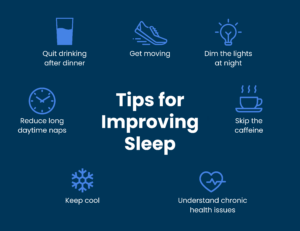“Even though I slept the whole night, it still feels like my sleep was broken.”
“I was asleep, but it felt like I never really slept.”
“I woke up in the middle of the night, and couldn’t fall back asleep for ages…”
These are common complaints that many people experience due to “fragmented sleep”. Research has shown that prolonged fragmented sleep can accelerate brain aging, cause memory decline, and elevate the body’s inflammation levels. So, how harmful is fragmented sleep? And how can we improve our sleep quality? Let’s explore.
What are the Dangers of “Fragmented Sleep”?
Fragmented sleep refers to sleep that is interrupted due to various reasons, with multiple awakenings during the night. People who experience fragmented sleep are usually acutely aware of each awakening and find it difficult to fall back asleep after waking up.
Fragmented sleep prevents individuals from entering deep sleep stages, leaving them in lighter, non-restorative phases of sleep. This lack of deep rest makes it difficult for the body to fully recover, and it impacts the brain’s ability to clear out toxins (“garbage”). It also disrupts bodily metabolism.
As a result, those who suffer from long-term fragmented sleep may experience daytime sleepiness, memory decline, difficulty concentrating, and even face the risk of developing issues in their metabolism, cognition, cardiovascular, and immune systems.
The four main harms of fragmented sleep are:
- Cognitive Impairment: Memory loss, slower reactions, and reduced work efficiency.
- Metabolic Disruption: Increased risks of chronic diseases like hypertension and obesity.
- Increased Cardiovascular Risk: Higher likelihood of developing heart disease and other cardiovascular problems.
- Weakened Immune Function: Greater susceptibility to infections and illnesses, including cancer.
What Defines “Good Sleep”?
Generally, the criteria for judging whether sleep quality is good includes four main factors:
- It takes less than 30 minutes to fall asleep after lying down.
- Waking up during the night occurs no more than twice before waking up in the morning.
- Not waking up too early: Waking up more than 30 minutes earlier than your usual wake-up time is considered an issue.
- Waking up feeling refreshed, as if you’ve been fully recharged—often referred to as “full energy restoration.”
How to Improve “Fragmented Sleep”?
Fragmented sleep is linked not only to genetic factors, age, and underlying health conditions but also to lifestyle habits. Long hours spent looking at your phone, staying up late, and lack of exercise are common culprits that worsen fragmented sleep.
Doctors recommend several steps to improve fragmented sleep:
- Establish a Regular Sleep Schedule: Go to bed and wake up at the same time every day to regulate your biological clock.
- Avoid Long Screen Time Before Bed: The blue light from screens interferes with melatonin secretion, which disrupts sleep quality.
- Avoid Stimulants Before Bed: Drinks like coffee and alcohol, as well as spicy foods, can interfere with sleep.
- Exercise Regularly: Exercise not only improves physical health but also enhances sleep quality.
- Relax and Reduce Anxiety: Practicing relaxation techniques and managing stress can significantly improve sleep quality.
Conclusion
The consequences of fragmented sleep are significant, affecting everything from cognitive functions to metabolic health. Fortunately, by adopting healthy sleep habits and making small adjustments to your lifestyle, you can improve the quality of your sleep and reduce the negative effects of fragmented sleep. If you’re experiencing sleep disturbances, consider the tips mentioned above and start making positive changes today for better health tomorrow.




